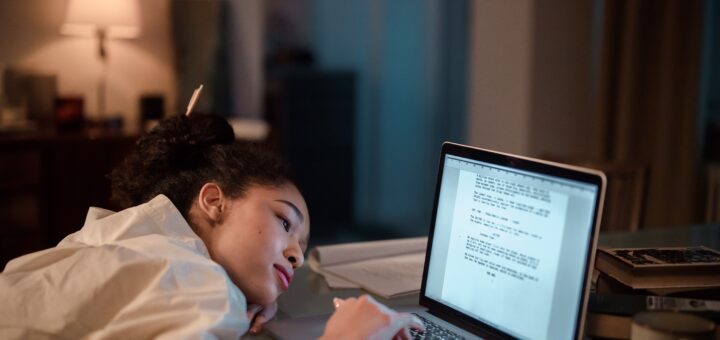Is it ‘Zoom fatigue?’

By Abbie Riglin, Staff Writer
As a student in the age of virtual video meetings, it has been easy to fall into the spiral of feeling like COVID-19 will never end and that my university experience will be spent between an endless back and forth of online and in-person classes.
I feel like I should be able to be on campus, building relationships with my peers, receiving help from my professors and frankly, using my parking pass. Unfortunately, the only way I’ve been able to connect with others is the small emoticon attached to a faceless name and a grainy video that cuts out every second sentence. I’m still trying to figure out a use for my parking pass, but hey, less money spent on gas is a bonus, right?
My experiences with online learning are complicated. Although I find it has helped me on a personal level with some serious self-discovery, I’ve never had such a difficult relationship with school, and on a larger scale, the internet.
Having to rely on video conferencing to both learn and socialize has caused a burnout in me that I didn’t know was possible. I’ve spent more time than I care to admit realizing that I’m suffering from ‘Zoom fatigue,’ an exhaustion associated with overuse of online platforms to communicate.
Over the past two years I’ve experienced virtual fatigue first-hand, and although I’m far from having perfected the method of learning online, I’ve built a list of tips and activities that have helped me combat my own online related issues.
Scheduling
I cannot emphasize enough the importance of having a calendar to keep track of your weekly tasks. I know there are people who are firm believers in Google Calendar, but after a long day online that’s the last place I’m going to look to see what’s next. My personal preference is a physical paper planner, preferably with monthly pages so I can see my long-term schedule in one glance.
Answering the FAQ — camera on or camera off?
Looking at yourself is proven to be mentally draining, and a large factor as to why video conferencing can be so exhausting and why most of the time your camera ends up off anyways. It’s important for everyone to have face to face contact, even if it’s over video, so my method has been to turn off self-view, eliminating what essentially is like a mirror, as you go about your daily conversations. No one’s looking at you, I promise!
Socializing
This is an essential need for all people, so if you’re suffering from a lack of human connection, it’s time to plan a movie night! There’s lots of programs that allow you to watch movies and TV shows in real time with others. If that’s not your thing, even setting aside an hour of each day to talk with your friends is a great start. If you’re like me and are always looking for new people to connect with, Mount Royal University offers lots of great ways to socialize through clubs!
Walking
Okay, now it’s time for the classic tip where an author reminds you that exercise is a great way to boost your morale, but I’m not into that heavy cardio stuff. All you need is a good old-fashioned walk. It’s easy and it gets you outside. End of discussion.
Wordle
This is a new one for me, but I find that having something that isn’t schoolwork but still stimulates your brain has become a key part of my day. Doing my daily Wordle is my current lifeline and something I look forward to every day.
Rewarding yourself
People think accountability is the biggest piece of being productive but knowing when to reward yourself plays a huge part in getting things done. I like to promise myself something after each task. Sometimes it’s something as small as a cookie or as big as treating myself to dinner. This gives me something to look forward to. Rewards can often lead to even greater successes.
Online fatigue is intense, but unfortunately it doesn’t seem like it’s ending anytime soon. So, whether you embrace the use of the internet or swear it off completely, finding the good things (even the smallest) will create a better environment for learning and hopefully help reduce stress.





